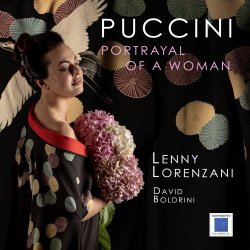
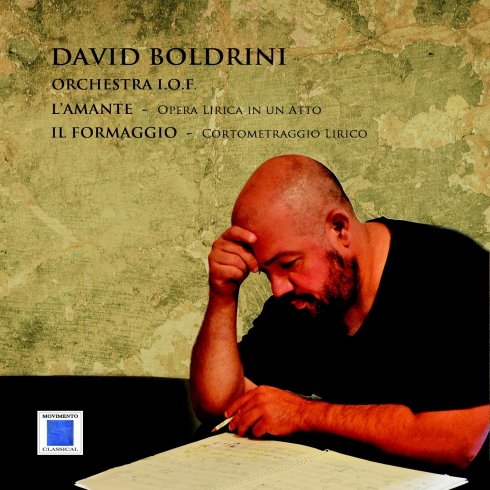
L' Amante Il Formaggio
The Lover
lt only took 10 days to compose The Lover, in August 201 7. lt is a one act Opera, the first one composed by David Boldrini. lt is the story ofthe mocking love of Annibale for his lover Luisa Ceccarini. The setting is the city of Florence, 201 7. Annibale Pinelli is a famous conductor who has been married for many years to Sara, a pianist . They have two teenage kids Francesco and Teresa who live with them. Annibale 's mother-in-law Rosalba, although she lives on her own, goes to visit them very often, which represents a big intrusion in the Pinelli family affairs. The afternoon domestic !ife of Annibale and Sara, as shown in the act, is a continuous flow of hysterical moments . They play the roles of resigned husband and wife trapped in a house of habits . The objects in the house seem to dominate them and cause ali the events of their lives : the dinner to be prepared, the arrivai of the mother-in-law with her grocery shop ping, the vacuum cleaning, the kids and their small talks about their girlfriends and boyfriends, ali the reproaches, the memories of a love that has faded and changed so much... lt is ali part of the 'normai' domestic dullness typical of so many families . A sudden and unexpected change of scenario happens when Annibale and Sara accidentally swap their celi phones .
The character of Luisa Ceccarini is constantly present even though she never shows on the stage. She dominates the plot with her continuous messages to Annibale's phone. She soon turns into a disquieting figure. Annibale wants to seduce her during their virtual afternoon conversations but in the end she turns out to be Sara's lover. Homosexual love appears for the first time in an Opera , and the initial comedy becomes a moving psychological drama for Annibale . He is crushed by technology, bourgeoisification and detachment from reality. Every character in this Opera tries to escape from ali the family neuroses in search of freedom and happi ness. But they end up realizing that the family represents their actual prison with its physical distance imposed by technology, its habits and the illusion of reaching freedom not confronting the others but just avoiding them.
The Lover is introduced by a short ouverture enumerating the main themes . Every character corresponds to a different one (five totally) plus the initial one that ap pears during an argument between Sara, Annibale and Rosalba .
The mother-in-law theme is stagnant and lame, the son one Francesco is arrogant, Teresa instead is relaxed and fresh. Sara carries inside herselfthe burden ofthe fail ure of the love for her husband, Annibale 's theme is instead pindaric and dreamy; he tries to escape reality and finds hope every time Luisa Ceccarini appears. Annibale's theme dramatically ends the Opera with a final irreversible and unex pected C minor explosion.
Cheese
Cheese was written between the 7th and 9th of September 2019. lt is the first short Opera of Music History . Both libretto and music were composed by David Boldrini. lt is the story of a piece of Taleggio cheese and a married couple: two little mice named Valentino and Maria Pippa. Their roles are played respectively by a Tenor and a Soprano. Valentino and Maria Pippa have been living for years in a mouse hole in an attic and their dose neighbours are a female cat and Amilcare, an old mouse (both of them played by mimes). One evening, after the female cat chased them - as usual - the little mice were able to escape and find a safe piace away from the cat's claws. Ali of a sudden, right in front of their mouse hole, they noticed a big piece of cheese that had accidentally fallen from the tabie. They were so amazed and happy in the beginning: they had been so lucky ! But right after the first moment of joy , Valentino and Maria Pippa started to feel dismayed and hesitant: how would they carry such a big piece of cheese into their house without running any risks ? The cat was around, maybe having dinner somewhere, and in case she suddenly returned their lives would be in danger. Maria Pippa felt strong and young: she discouraged Valentino from leaving their house and go out to catch the piece of cheese . lt was not worth it: if he was caught by the cat she would die from grief. Valentino instead, manfully, replied to his beloved that he was strong and capable enough to face the cat bravely. So they began to bicker but their argument suddenly ceased when they were literally overwhelmed by the smell of the cheese dose to them. They began to dream of how happy that piece of cheese would make them. Right in the middle of their short dream they began to hear the footsteps of Amilcare, the old mouse. He had returned from a long walk and when he saw the piece of Taleggio cheese, he grabbed it unemotionally and took it to his mouse hole not far from Valentino and Maria Pippa. He then shut the door and locked it. lt was over, Valentino and Maria Pippa were left empty-handed. Valentino felt so discouraged, he was not even scared any more. He started to walk and did not even realize that he was moving right towards the exact piace where the piece of cheese was standing a few mo ments before. Right when he was walking along that distance that had scared him so much, he noticed a mysterious ray of light coming from a small window located right on top of the roof of the attic. lt was the light of the moon gleaming in the sky and caressing him. Before that moment Valentino had only heard about that light . So he went to Maria Pippa and said with a moved voice and full of emotion: 'Look, look! '. She reached him and stood by his side. She saw the full moon in the sky and asked in a disarming and spon taneous way what it was. Then she said that it looked like a beautiful sweet cheese wheel. Valentino knew that that was the moon, something he had heard ofin human beings conversations. The moonlight and the smells of Aprii per vaded Maria Pippa's and Valentino's souls. They were not able to seize the moment and grab that piece of cheese but they had the most important things : the Moon, Spring and most of ali their love for each other. So they headed back home, the lights started to fade and the moon started to illuminate the night. The female cat carne again into the room and bumped into a piece of cheese on a shelf. The cheese fell ac cidentally right in front ofValentino and Maria Pippa's home. The story teaches us severa! things: to seize the moment first. The piece of cheese had to be carried im mediately to their homes. Amilcare was a lot older than the two mice, he was faster, greedier and did not hesitate in his actions . But actually, alter Valentino lost the object of his desire, he found himself in a state of inner ecstasy which finally al lowed him to reach, with no fear, the piace where the Taleggio cheese was. This proves that after a bigshock, if one is able to Jet ali his inhibitions go, he can reach a new dimension, away from his comfort zone (the mouse hole) and abandon ali the certitudes he thought he could not live without. This means evolving, growing an discovering something new that will illuminate everyone with a different light.
The moon represents Valentino's inner soul. Alter he got rid ofhis primary desire of wealth and of his comfort zone , he was illuminated by something above him that looked just partly like the cheese. But the cheese represents only the pleasure ofthe flesh and the wealth; Valentino reached a higher leve!, unexplicable and superior, stronger and pure. The marvel of such a discovery made Maria Pippa and Valentino well aware of the certainty of their love for each other that fulfilled ali their desires. So is love the most important thing? Or are the changes and the evolutions that we have to go through as important? The uniqueness of this musical fairy tale is its shortness. lt is a real-time fairy tale, with no in-depth psychological analysis. lt is completely different from the melodrama where stories become longer because of the detailed psychological analysis of its characters.

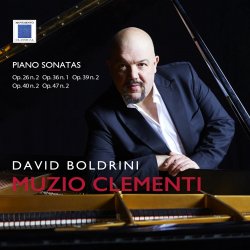

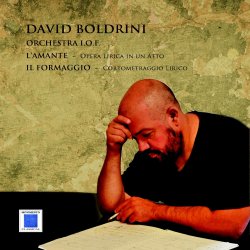
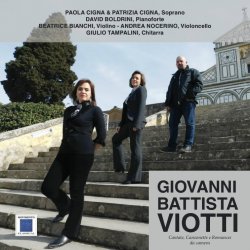
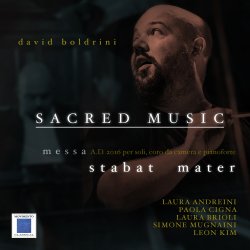
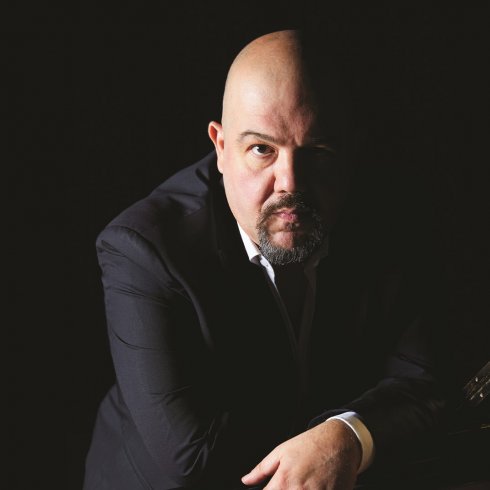
DAVID BOLDRINI
He graduated in piano at the Conservatory Cherubini in Florence in the class of Lidya Rocchetti with full marks, honors and honorable mention.
At the same time he graduated in organ and organ composition at the same conservatory studying in the class of M. Mochi .
He thus began to follow the master classes held by Bruno Canino at the Marziali Academy of Seveso and by the “Trio di Milano” at the music school of Fiesole. He also attended the two-year course held by the piano duo Moreno - Capelli , at the “la Musica Interna” in Bologna. He was an effective student of numerous master classes including those held by P. Badura Sckoda at Villa Medici in Milan, Bruno Canino at the “gli Amici della musica” in Florence and Fabio Bidini in Arezzo .
In 2001 he studied piano with Vincenzo Balzani at the Cantù music school, and then he attended the three-year course at the Imola piano academy " Incontri con il Maestro ", in the chamber music class of Pier Narciso Masi .
He also studied piano for four years at the Sesto Fiorentino music school with Pier Narciso Masi .
Winner of numerous competitions. In 2001 he was awarded the "LIONS" prize as the absolute winner of the “Città di Follonica” piano competition, in 2003 he was awarded as best chamber pianist at the “Luigi Nono competition” in Turin ( Venaria Reale ). In the same year he was first overall at the Rospigliosi competition and second overall at the International Valtidone competition in Piacenza .
In 2004 he was the absolute winner of the “Di Vicopisano” and “Nuovi Orizzonti” piano competitions in Arezzo.
Regularly invited as a soloist and as a chamber musician in prestigious associations, he performed for “L'associazione Fioravanti” of Prato, the “Lycaeum of Florence , the “i Concerti del Cicognini” of Prato, “Associazione musicale lucchese”, “Estate Frentana”, “Festival Barocco internazionale - Orchestra sinfonica” of Sanremo , “I concerti del museo casa Ivan Bruschi” of Arezzo, “Associazione giovani musicisti fiorentini Museo Chiesa di Dante Alighieri”, “Associazione Damaris” of Pistoia, “Teatro del lido” of Ostia, “Agimus Roma”, “Campus internazionale di musica” of Latina, Music Week in Brussels.
Chamber musician requested by internationally renowned artists, he collaborates alongside Maria Luigia Borsi, Andrea Bocelli, Paolo Chiavacci, Brad Repp, Augusto Vismara.
Since 2005 he has been the artistic director of the “Associazione Ramimusicali” of the homonymous concert season and of the competition which has reached its third edition this year.
